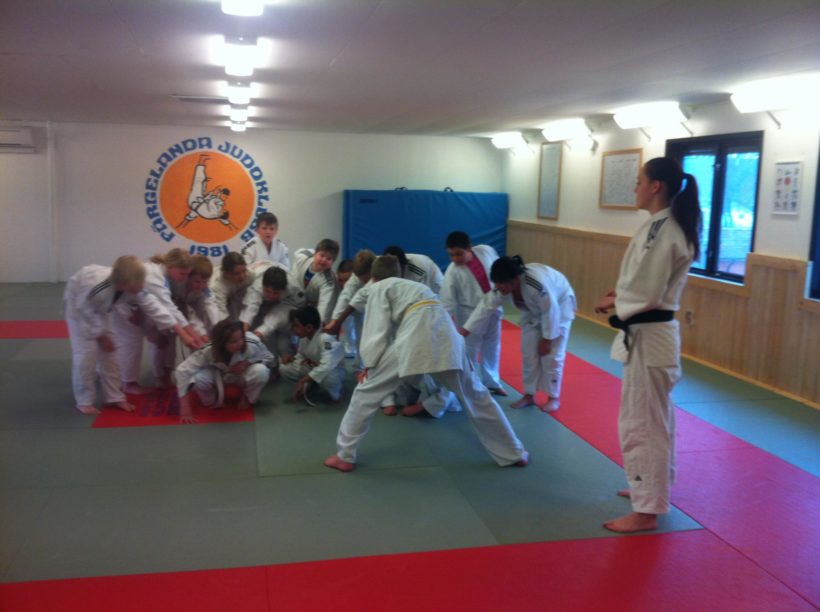As in my previous posts it’s from my own thoughts and experiences and background in judo. There’s no right or wrong. Im going to share my thoughts as a child and youth-coach. The role is both fun and demanding. I hope to give you a eye-opener and an interesting way of seeing things. To adapt to each situation, know the dynamics of a group and how to best reach out in your lessons.
DEVELOPING To be a coach for a group of judokids. Some people who is’nt coaches or just are starting their journey as one can at first see the role as uncomfortable, feeling unsure and seing it as a big responsability. Sure that you have a responsability in terms of adapting to age, competition, ambitions and the fysical possibilities. Maybe you even have a disabled judoka within the group. I know that many think that not every person are suited for the coach-role, dont have the right qualifications, education or the psycological gift. But i feel that the most ones could be a good coach with the right guidance and mentorship over time. Also with grade and maturation. Because you teach something you know and been doing for a long period of time. Then its the other part. To teach and reach out. And how. Either to chop a technique into pieces or to take it as a hole thing. You will learn either way more about yourself.
ADAPTION How you teach is also a process when you have a group of your own. How do they percieve you, what tone and volyme of your voice, eyecontact, showing joy or determination. Do you let the kids response, ask questions, take place within the group and so on. Many things are important when you think about it. There are many types of different coaches. Hard, energetic, fair ones or to kind. The balance is the challange. And how to express yourself, help them and correcting. Its easier said than done. Its an neverending process and you learn something new at every ssesssion. I’m for that every child has the right to take place within the group even the shy or the strong ones and to push for positive praise. To mention the good before the correction. Something that i had trouble with before was to handle when someone got sad. To make them continue training with the same partner. But first accepting why the kid is sad and then choose humour as a key forward. To distract is one way of doing it.
COMPETITION EXPERIENCE There are many situations during my “judo years” that many coaches dont have an understanding for their judokas and gives them a hard time during trainings and competitions. I think it’s a shame and nothing good ever comes out of it. That on competitions screaming like its a Olympic-final and if they loose they will get angry. Instead of encurage them, tell them the good part of the fight and make them look forward on the next one. And then theres the demand to win. You should enjoy to compete which I did when I was young and i didnt have any pressure on me. To get a medal where just a bonus. If i would have a pressure on me to succed i think i would have stopped competing at an early age. Its about the kids here. If you as a coach are negative and hard on them it is no longer about them its about you. To compete is developing for your techniques and also good to meet others that you dont usually train with on your club at home. Then that everyone doesn’t want to compete you should also have to respect even if you have a big experience for competitions. You can be as good anyway even if you just train as long as you have the interest. Important things i want in a kids group is:
That every kid can train with all the others within the group
To hold up your uke after throwing and to dare to get throwned
Able to calm down after play and could talk to me as a coach in confidence
Being quiet when others speak or when the coach is instructing
To cooperate both in exercise and in throwing
To take place in in the group and feel safe
GOOD COMMUNITY There are many more things but at the moment theese are important for the group to function and developing. You can also see on a short period of time how a beginner adapts fast to the group patterns and how to behave during trainings. Its fun to see. Its important to listen and not to have a distance to the kids that some coaches may have. That you as a kid don’t dare to talk to the coach and instead just train on and hide within the group. But its also important that there are many different types of coaches for the sport anyway. The role is an neverending process and you never get fully learned. The ones who think they know everything misses out of an important point of developing.
NEW CHALLANGE A big aha moment for me was when suddenly we got a blind kid who started within the kids group. I hade to rethink and it took a couple of trainings before i knew how to plan the training, treat the kid and also to not let the training adapt after him and his ability. That both use your voice, the psysical and guidance with him. At the end he could throw, be in games that evolves chasing, different other games, to move by himself on the mat. If he gets closer to the mat-ends you could just correct him by voice. The wonderful thing was also that the group soon adapted him within the group, helping him and so on. Its was a beatiful experience for me.
FEAR A different aspect that i often meet is when we are out on recruitment in schools on their sportclasses. When also some of the special needs kids and physical abilities are not the same as the other ones. The teachers start our conversations by saying what the kids can’t do and are negative and think the whole thing is dangerous for them. That they can’t participate in games and so on. Sure that they can’t understand everything to a hundred percent but they can be in the game at their own ability. You should never limit someone in something that can bring them joy. That everything should be correct is a sad way to see it. To be a coach is a rollercoaster but it’s extremely educational. You take in every situation separetly and processing it. How do you view the coach-role?
Eleonor

